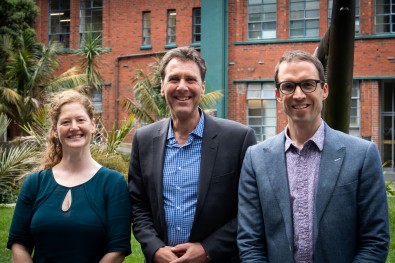Co-Directors' Report - Annual Report 2019
17 April, 2020
 A major focus for the MacDiarmid Institute in 2019 was building the proposal for our next eight years of CoRE funding.
A major focus for the MacDiarmid Institute in 2019 was building the proposal for our next eight years of CoRE funding.
The process was both a wonderful opportunity to come together and dream about the ways in which materials science will transform New Zealand in the coming decade, as well to reflect on how far we’ve come since our beginnings in 2002.
We’re connecting more closely with our alumni – New Zealand’s future leaders. A survey of MacDiarmid PhD graduates over the past five years shows that over 70% are employed in senior technical roles, including local materials science-based startup companies. Over two thirds of our alumni remain in New Zealand. Considering that two thirds of our PhD recruits come from abroad, the Institute is doing its part to ‘make New Zealand a place where talent wants to live’, in the words of Sir Paul Callaghan.
Materials science is central to climate action. 2019 was a significant year – from the student climate strikes, to Greta Thunberg’s powerful address at the United Nations, and the passing of the Government’s Zero Carbon Act.
The MacDiarmid Institute’s research in renewable energy materials was highlighted at the national ‘Just Transition’ summit – held in Taranaki to tackle our pathway to zero carbon. Some of our technologies for climate change mitigation have also been seen by hundreds of thousands of visitors at Te Papa museum, and were the topic of our Sustainable Innovations regional lecture tour.
In this coming decade humanity needs materials science more than any decade before it. As the stories in this report will show, this year we have, once again, unified NZ materials scientists for a common goal: to make, understand, and use new materials to improve people’s lives.

Nicola Gaston and Justin Hodgkiss
Co-Directors


